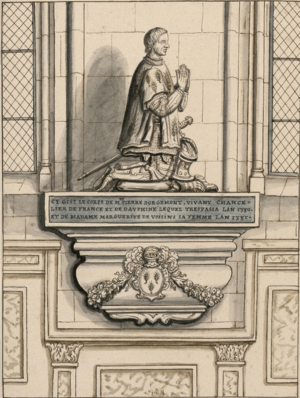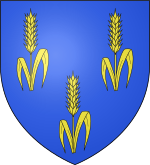Pierre d'Orgemont facts for kids
Pierre (I) d’Orgemont was an important French politician. He lived from about 1315 to 1389. He played a key role during the Hundred Years' War, a long conflict between France and England.
Contents
Early Life and Career
Pierre d'Orgemont was born around 1315 in Lagny-sur-Marne, a town near Paris. His family was from the middle class. He studied law and became a lawyer in 1340. He worked at the Parlement de Paris, which was a high court in France.
In 1347, he became a master clerk at the Parlement. This was an important legal position. By 1355, he was the first president of the Parlement.
Loyalty to the King
Pierre d'Orgemont was very loyal to the French king. This was especially true during a difficult time for France. King John II of France was captured by the English in 1356. This happened after the Battle of Poitiers.
While the king was held captive, there was a revolt in France. The Estates General, a kind of assembly, tried to take more power. Étienne Marcel led this revolt in 1357. Pierre d'Orgemont stayed loyal to the king's son, the dauphin. The dauphin later became King Charles V of France. His loyalty earned him the dauphin's trust.
Becoming Chancellor of France
On November 20, 1373, Pierre d'Orgemont was chosen as the chancellor of France. This was a very high position, like a chief minister. What made his election special was how he was chosen. King Charles V gathered a group of important people. This group included church leaders, princes, nobles, and judges. They all voted to elect the chancellor.
In the year one thousand three hundred and seventy three, on Sunday 20th November, our king held his grant and general council at the Louvre, from prelates, from princes of his line, barons and other nobles, from the lords of the Parlement, from the 'requestres de son Hostel', from the 'Comptes', and other councillors up to the number of twenty-six-and-ten persons or thereabouts, to elect the chancellor of France
This way of choosing a chancellor was unique. No other chancellor was ever elected this way again.
Later Career and Retirement
Pierre d'Orgemont became a knight at Christmas in 1373. He served as chancellor until 1380. He retired after King Charles V died. King Charles V trusted him so much that he made Pierre d'Orgemont an executor of his will. This meant Pierre helped manage the king's final wishes.
After retiring as chancellor, he became a maître des requêtes for the Parlement de Paris. This role involved handling petitions and legal requests. He also helped write parts of the Grandes Chroniques de France. These were important historical records of France from 1350 to 1380.
In 1384, he became chancellor of the Dauphiné. This was a region in southeastern France. He was appointed by King Charles VI of France.
Chantilly Castle
In 1386, Pierre d'Orgemont bought the lordship of Chantilly. This included land and a castle. He soon started building a grand new castle with a moat. A moat is a deep, wide ditch, usually filled with water, surrounding a castle. The castle was finished after his death by his son, Amaury.
Family and Legacy
Pierre d'Orgemont died on June 23, 1389, in Paris. He left behind a lasting legacy as a loyal and important figure in French politics. His family continued to be influential.
 | Charles R. Drew |
 | Benjamin Banneker |
 | Jane C. Wright |
 | Roger Arliner Young |



